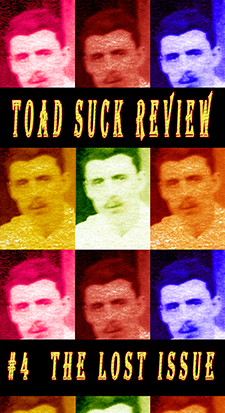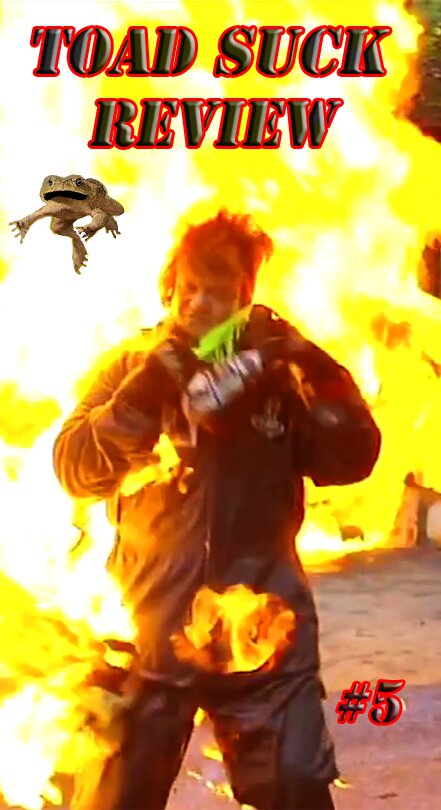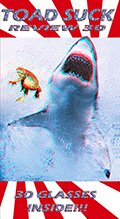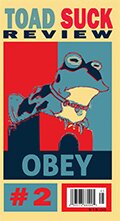Welcome Toad Nation, to the fourth Toad Suck Review, in which the concept of lost is the binding theme. A recently discovered image of the legendary poet Arthur Rimbaud, lost in Abyssinia, proudly (& in Warholian Splendor) announces what we’ve unearthed from the gone annals of literary history. Our Rimbaud feature includes the first-ever English translations of two questionably lost Rimbaud poems. We also have a feature on William S. Burroughs, wherein a letter to Allen Ginsberg, lost for over fifty years, envisions the Great Beat Junky’s now-famous cut-up method. On the back cover, you’ll see a mural by the mysterious underground artist Banksy, who leaves his mark on the public domain by playing with a refaced/defaced fresco of Christ, recently “restored” in Italy. The question here, however, isn’t whether something was lost in Jesus’ make-over; it has to do with the toad in the corner, which doesn’t appear in other photos of this wall. Hence: Is that toad legitimately Banksy’s, or is it another bastardization? Then there’s the fine prose of Charles Portis, whose work is currently being rediscovered, especially in the lost classic “The Forgotten River,” an essay of true grit, straight out of Arkansas. We also have an interview with Damien Echols, the infamous “Ringleader of the West Memphis Three,” who was scapegoated into a false conviction, which led to eighteen years of lost life flushed away just like that.
 Our poetry section contains work by the iconic Simon Perchik, whose “nothing, nothing―a rain / with no one to take hold” defines the epitome of loss. Outlaw poet klipschutz also takes a stand, writing in a lost semi-Baudelarian form crossed with a soon-to-be-lost Dada logic. Jeffrey Zable, on the other hand, celebrates loss, when “little in this life / happens on our own terms.” Claire T. Feild addresses a sullen loss of life and actually ascribes it a color. The verse of Kyle Flak, Billy Cancel, Christopher Citro, and Dustin Nightengale intentionally loses track of conventional expectations, thereby creating sense from non-sense.In Nonfixion, JD Iripino’s comic portrait of our ridiculous selves concludes with the assertion that not all is lost. Meanwhile, Jennifer McGaha steels herself to a world in which the loss of property becomes the ephemeral-but-empty gain of a good Christian kid lost in the Flux of Mendacity. As for John M. Fayhee’s hilarious narrative of losing altitude in a couple of disastrous hot air balloon rides, the proof is in the pudding and the pudding’s in his pants.
Our poetry section contains work by the iconic Simon Perchik, whose “nothing, nothing―a rain / with no one to take hold” defines the epitome of loss. Outlaw poet klipschutz also takes a stand, writing in a lost semi-Baudelarian form crossed with a soon-to-be-lost Dada logic. Jeffrey Zable, on the other hand, celebrates loss, when “little in this life / happens on our own terms.” Claire T. Feild addresses a sullen loss of life and actually ascribes it a color. The verse of Kyle Flak, Billy Cancel, Christopher Citro, and Dustin Nightengale intentionally loses track of conventional expectations, thereby creating sense from non-sense.In Nonfixion, JD Iripino’s comic portrait of our ridiculous selves concludes with the assertion that not all is lost. Meanwhile, Jennifer McGaha steels herself to a world in which the loss of property becomes the ephemeral-but-empty gain of a good Christian kid lost in the Flux of Mendacity. As for John M. Fayhee’s hilarious narrative of losing altitude in a couple of disastrous hot air balloon rides, the proof is in the pudding and the pudding’s in his pants.
Translatio, of course, features France’s most mythical boy-genius enfant terrible, as mentioned above, whose greatest lost forgery has been masterly translated by Daryl Spurlock. The research and Toad commentary in this feature was mainly the product of Scotty Lewis, Assistant Editor from last year. But wait! Nobel Laureate Vicente Aleixandre is also translated in this section through an art in which sacrifice is imminent, except when exquisitely rendered by Stephen Kessler.
Our Arkansas focus leads off with Matthew Henriksen, whose elusive “Forgiveness as an act of theater / on the meat hooks” suggests a desperation propelled by the driver of loss. Seth Pennington’s vision of the homeless (home-loss) in the San Francisco Library is, in a sense, a sophisticated exposé of “pink potted meat” just trying to survive another day.
The luminaries in Critical Intel include Tom Lavoie reviewing Portis, C. Prozac commending Ed Sanders, Joshua D. Bellin on racism, Greg Graham extrapolating Emily Dickenson, Bob May providing pointers on producing drama, and Bob Mielke exploring the imagination of Indian filmmaker Radha Bharadwaj. What these scholars have in common is their loss of seconds and minutes and years compiling their thoughts into this exact micro-second, in which you, dear reader, stand at the gates of their labor, where their rays of insights beckon you to enter.
And O the lowly losers in Fixion! Not the writers, but their characters. Eg, Radha Bharadwaj’s delusional romantic whose quest for an American blonde ends in disaster. Witness also Jaqueline Doyle, whose loser professor lodges a grievance in an academic parody of denial in action. Or Michael Cuglietta, whose protagonist loses his respect for life. Don’t worry, though, this story is hardly a bummer in the end. Sean Rabin, however, breaks from the mold of profiling losers in this section. His “lost liner notes” of a cult album envision the aesthetics of a disquiet mind.
Beth Ann Fennelly and Tom Franklin appear in our Artists-in-Residence feature, spotlighting an excerpt from their collaborative novel The Tilted World. This tale of murder and moonshine framed by a literal flood of loss is then reviewed by Kelvin Krill.
Now we arrive at the Eco-Edge, where Doug Luman’s historical approach to verse looks at a tragic loss of life aflame in the wilderness. (As an aside, we’d like to note that it is not the Toad’s policy to publish its own editors, but after we accepted Doug’s work, he applied to the Arkansas Writers MFA Workshop, and with qualifications such as his, there was no way we couldn’t accept his technical wizardry and artistic sensibility. Hence, he is now our Assistant Editor.) The other environmental visionaries in this section are David Taylor, reminding us of what we have to lose; Scott Ezell, lost in Laos; and JoeAnn Hart, whose story of a beaten boss results in an epiphany that can’t accept an eco-loss.
Of course, we also have some artwork in here by JJ Cromer and Sarah Katharina Kayß. JJ’s collage methodology is definitely postmodern in that it tells all prior movements to get lost. As for Sarah’s whimsical photographs, there’s a kind of loss inherent in each that declares a certain freedom of expression.
Finally, there’s the Romanian writer Daniel Banulescu, expertly traduced by Adam Sorkin and Lidia Vianu. This semi-absurd knee-slapper of a poem ends this issue on a humorous note in which loss can actually be a bonus.
Speaking of this issue, you might notice that we’ve lost some inhibitions. When we started this publishing project as the Exquisite Corpse Annual six long years ago, we assured the Provost that we’d avoid graphic words and provocative commentary that might freak out the good people of the Toad Suck environs. That Provost, however, is long gone, and we’re ready to start taking some risks with the risque, or language and content that we might’ve self-censored before. I’m not saying that we’ve metamorphosed into an in-your-face literary journal; I’m saying that we’re finding our voice, and our voice is yours, and we’re glad to be part of your strut upon this stage, if only for a flash in Toad Time.
So adios, friends, and may the Toad be with you!
 '
'
 '
'
 '
'